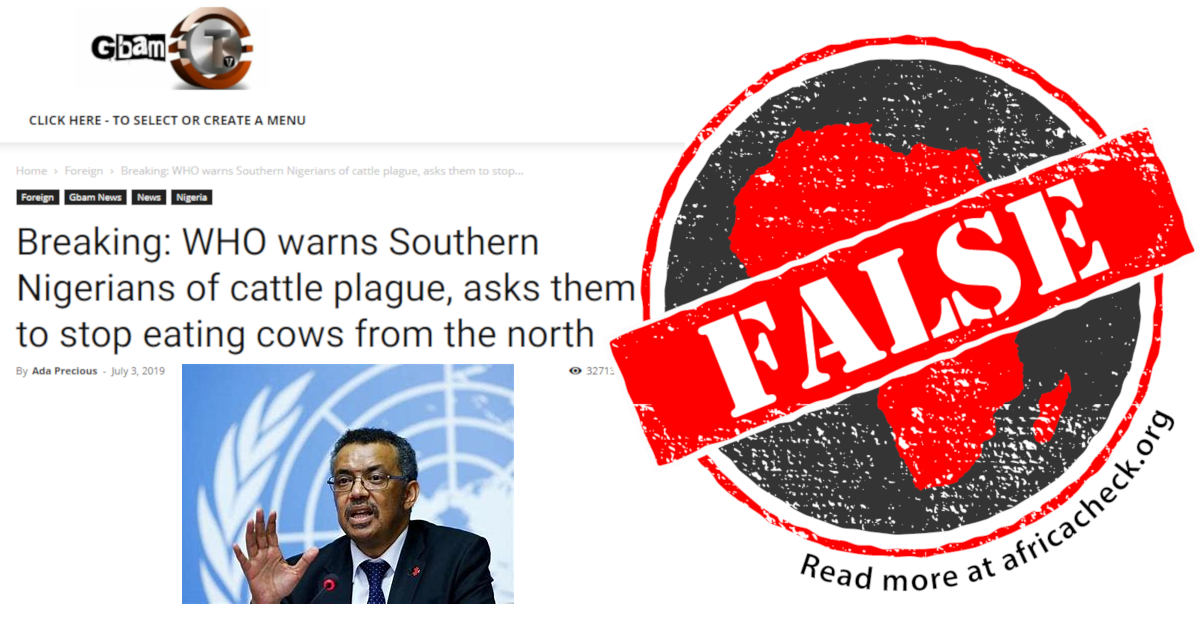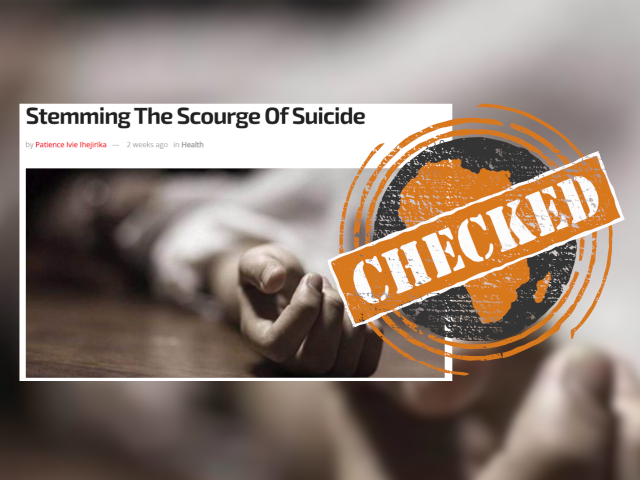Latsa nan don karanta wannan rahoto cikin harshen Hausa.
A report by website Gbam TV claims the World Health Organization has warned people in the south of Nigeria to stop eating meat from cows reared by the Fulani community in the north.
It also claims the WHO’s director-general Tedros Adhanom said this was due to a “cattle plague... culpable of killing citizens”.
The report says the “plague” was caused on purpose, with a political motive.
“According to him, the cow meat have all been infested by the Fulanis with the intention to wipe out the Southerners, more especially, the Yorubas and Igbos with the cow diseases before 2028.”

The WHO Nigeria and ministry of health have debunked the alarming claim, issuing a joint statement that they “strongly dissociate themselves from the misleading message being propagated via social media”.
The Nigeria Centre for Disease Control has described the claim as a “completely FALSE” rumour.
“The general public is advised to note that there are no cases of bovine tuberculosis reported to NCDC, nor are there concerns of this in the country at the moment.
“The public is advised to ensure that meat and other food to be consumed is well cooked and safely handled to avoid the spread of foodborne illnesses,” the statement says. - Africa Check
A wani rahoto da wani shafin yanar gizo na Gbam TV ya ruwaito yace hukumar lafiya ta duniya ta gargadi yan kudanchin najeriya da su daina cin naman shanun da aka kawo daga arewancin kasar.
A cewar rahoton darakta janar na hukumar Tedros Adhanom ya ce “saboda wata cuta da dabbobin ke dauke da ita wadda zata iya kashe bil adama”.
Rahoton ya cigaba da bayyana cewa “an sawa dabbobin cutar ne don a kashe mutanen kudu musamman yan kabilar yarabawa da ibo kafin shekarar 2028”.

Ofishin hukumar kula da lafiya ta duniya da ke najeriya da kuma maaikatar lafiya sun karyata labarin, inda suka fitar da wata sanarwa da ke cewa “ba su da masaniya ko hannu cikin wannan jita-jitar da ke ta yawo a kafafen sada zumunta na yanar gizo”.
Hukumar kula da kiyaye cututtuka masu yaduwa ta Najeriya ta bayyana cewa wannan “labarin karya ne”.
“Jama a su sani cewa hukumar bata samu wani labari na bullowar cuta ga dabbobin ba, haka nan ba ta zaton bullowar cutar a kasar nan a halin yanzu.
Hukumar na gargadin jamaa da su tabbata sun dafa dukkan nama ko abincin da zasu ci yadda ya kamata don gudun yaduwar kowacce irin cuta da ka iya yaduwa a cikin kayan abinci,” a cewar sanarwar da hukumar ta fitar. – Africa Check
A report by website Gbam TV claims the World Health Organization has warned people in the south of Nigeria to stop eating meat from cows reared by the Fulani community in the north.
It also claims the WHO’s director-general Tedros Adhanom said this was due to a “cattle plague... culpable of killing citizens”.
The report says the “plague” was caused on purpose, with a political motive.
“According to him, the cow meat have all been infested by the Fulanis with the intention to wipe out the Southerners, more especially, the Yorubas and Igbos with the cow diseases before 2028.”

Debunked by WHO Nigeria and NCDC
The WHO Nigeria and ministry of health have debunked the alarming claim, issuing a joint statement that they “strongly dissociate themselves from the misleading message being propagated via social media”.
The Nigeria Centre for Disease Control has described the claim as a “completely FALSE” rumour.
“The general public is advised to note that there are no cases of bovine tuberculosis reported to NCDC, nor are there concerns of this in the country at the moment.
“The public is advised to ensure that meat and other food to be consumed is well cooked and safely handled to avoid the spread of foodborne illnesses,” the statement says. - Africa Check
Hukumar kula da lafiya ta duniya (WHO) ta karyata batun da ke cewa hukumar na gargadin yan kudanchin Najeriya dangane da cin naman dabbobin da aka kawo daga arewacin Nijeriya
A wani rahoto da wani shafin yanar gizo na Gbam TV ya ruwaito yace hukumar lafiya ta duniya ta gargadi yan kudanchin najeriya da su daina cin naman shanun da aka kawo daga arewancin kasar.
A cewar rahoton darakta janar na hukumar Tedros Adhanom ya ce “saboda wata cuta da dabbobin ke dauke da ita wadda zata iya kashe bil adama”.
Rahoton ya cigaba da bayyana cewa “an sawa dabbobin cutar ne don a kashe mutanen kudu musamman yan kabilar yarabawa da ibo kafin shekarar 2028”.

Ofishin hukumar WHO na Najeriya da NCDC sun karyata labarin
Ofishin hukumar kula da lafiya ta duniya da ke najeriya da kuma maaikatar lafiya sun karyata labarin, inda suka fitar da wata sanarwa da ke cewa “ba su da masaniya ko hannu cikin wannan jita-jitar da ke ta yawo a kafafen sada zumunta na yanar gizo”.
Hukumar kula da kiyaye cututtuka masu yaduwa ta Najeriya ta bayyana cewa wannan “labarin karya ne”.
“Jama a su sani cewa hukumar bata samu wani labari na bullowar cuta ga dabbobin ba, haka nan ba ta zaton bullowar cutar a kasar nan a halin yanzu.
Hukumar na gargadin jamaa da su tabbata sun dafa dukkan nama ko abincin da zasu ci yadda ya kamata don gudun yaduwar kowacce irin cuta da ka iya yaduwa a cikin kayan abinci,” a cewar sanarwar da hukumar ta fitar. – Africa Check
Republish our content for free
For publishers: what to do if your post is rated false
A fact-checker has rated your Facebook or Instagram post as “false”, “altered”, “partly false” or “missing context”. This could have serious consequences. What do you do?
Click on our guide for the steps you should follow.
Publishers guideAfrica Check teams up with Facebook
Africa Check is a partner in Meta's third-party fact-checking programme to help stop the spread of false information on social media.
The content we rate as “false” will be downgraded on Facebook and Instagram. This means fewer people will see it.
You can also help identify false information on Facebook. This guide explains how.





Add new comment